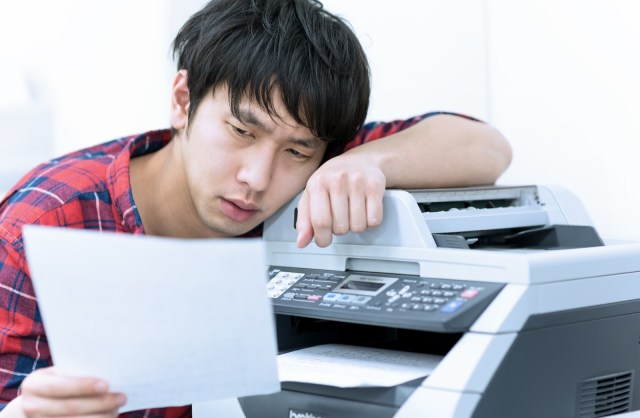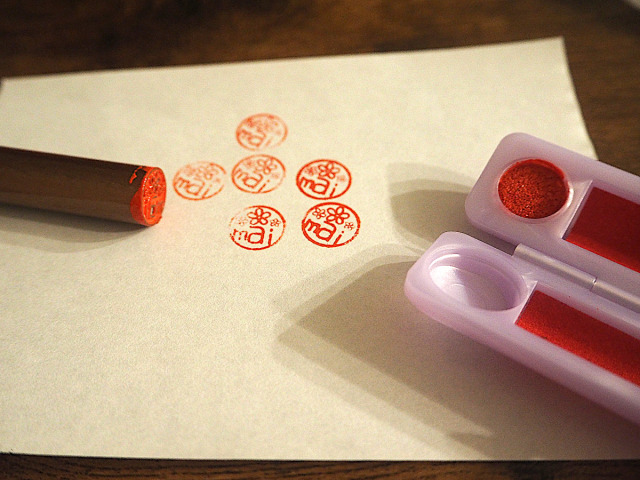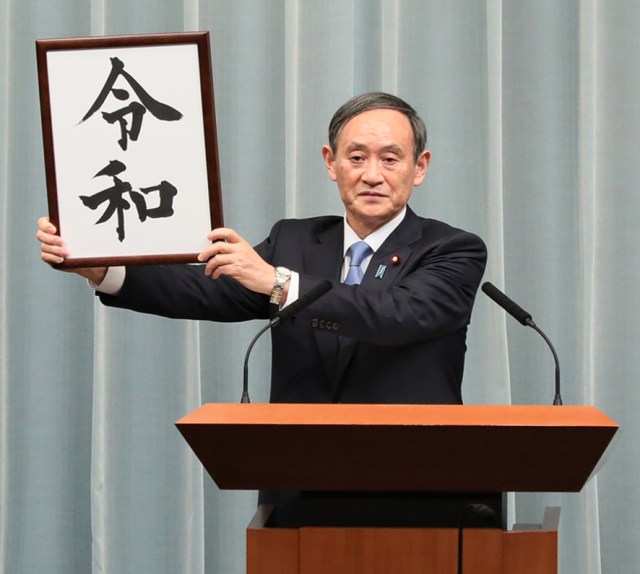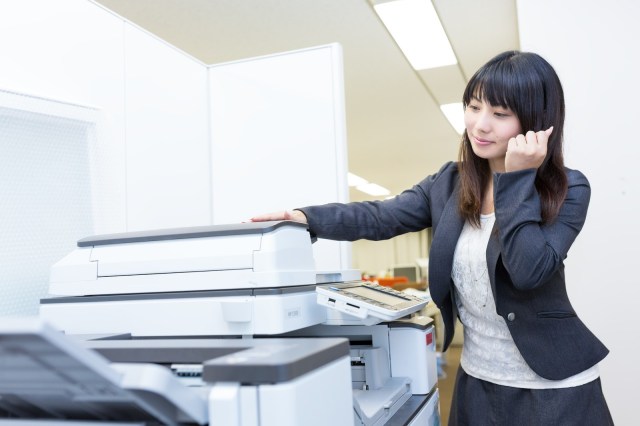
Just the fax, Kono.
After a longest term in office in the history of Japan, Shinzo Abe has stepped down as Prime Minister and the position has been given to his chief cabinet secretary Yoshihide Suga, or “Uncle Reiwa” as he’s known to a lot of teens.
▼ You might remember Suga as the guy who held the calligraphy that announced the name of the current Reiwa Era
All in all it was a very underwhelming transition of power, with very little changing or expected to change as a result. However, there was a cabinet shuffle that ensued, during which former Minister of Defense and Minister of Foreign Affairs Taro Kono was moved into the position of Minister for Administrative Reform.
He appears to have taken the role with gusto as he has already announced a major overhaul to the way the administration is run: no more fax machines!
▼ She seems happy about it.
I think we’re finally at the point were some readers might even be too young to remember fax machines, but these are essentially copiers that send the copies over a phone line to another machine anywhere else in the world which prints it out. That sounds impressive until you remember a little thing called the Internet that made faxes obsolete, like a good 20 years ago.
While much of the world turned their backs on these machines long ago, for some strange reason Japan has continued to cling to them, and they are still frequently used in business and government today. However, Minister Kono has had enough as of now, and promises to end the use of these devices in the near future.
That being said, stopping fax dependency isn’t as easy as buying a scanner and booting up a computer… I guess? According to Minister Kono, the real culprit behind faxes’ longevity in Japan is the hanko.

These personalized seals are often used on official documents in places where other cultures might use a signature. Essentially they are just a wooden, plastic, or rubber stamp that is registered with the government as the legally-binding official seal of a person or organization.
Kono says that first the use of the hanko must be done away with. Then and only then can they begin to address fax machines. Not only that, but once hanko are out of the way, he hopes to make the entire government paperless as well.
Although most comments online understand the uselessness of fax machines – because they’re, you know, online – some are skeptical that it can really be gotten rid of so easily.
“Other countries are surprised we still use faxes. They think it’s a waste of paper and time.”
“I was shocked when I heard that coronavirus cases are counted by fax.”
“I think it’s good to keep fax available as an option at least. It might come in handy during a disaster situation. A telephone line might reach an area where an optical cable is broken.”
“I work at a major transportation company and we don’t use fax anymore, but it’s still there in case of emergency.”
“But what will happen to the job of the guy who has to count all the coronavirus case faxes?”
“Most modern Japanese businesses actually don’t use faxes, but almost every business has a customer that still uses faxes and has to keep it around for them.”
“I think this shows the importance of younger people in government.”
At 57, Kono isn’t exactly a spring chicken but he is considerably younger than many other high-ranking members of government and appears to know how to use the Internet well enough, which makes him vastly more tech-minded than our head of Olympic cybersecurity who never touched a computer and former PM who pays his Twitter bills every month.
And with systems for digital hanko signatures already available for the rapidly growing number of Japanese teleworkers, it looks like the fax machine might finally see its end in Japan, and not a decade too soon.
Source: Nippon TV News 24, My Game News Flash
Top image: Pakutaso
● Want to hear about SoraNews24’s latest articles as soon as they’re published? Follow us on Facebook and Twitter!



 Tokyo temple holds funeral for personal seals in effort to reform outdated business practice【Vid】
Tokyo temple holds funeral for personal seals in effort to reform outdated business practice【Vid】 Japan is so polite even its hanko stamps bow to show respect
Japan is so polite even its hanko stamps bow to show respect Tokyo Olympic Committee trains 220 “hackers” to protect games
Tokyo Olympic Committee trains 220 “hackers” to protect games Shibuya gives each public elementary and junior high student a Surface Go 2 tablet for school
Shibuya gives each public elementary and junior high student a Surface Go 2 tablet for school Japanese government, please stop using floppy discs, politician asks
Japanese government, please stop using floppy discs, politician asks McDonald’s new Happy Meals offer up cute and practical Sanrio lifestyle goods
McDonald’s new Happy Meals offer up cute and practical Sanrio lifestyle goods All-you-can-drink Starbucks and amazing views part of Tokyo’s new 170 meter-high sky lounge
All-you-can-drink Starbucks and amazing views part of Tokyo’s new 170 meter-high sky lounge More foreign tourists than ever before in history visited Japan last month
More foreign tourists than ever before in history visited Japan last month Starbucks reopens at Shibuya Scramble Crossing with new look and design concept
Starbucks reopens at Shibuya Scramble Crossing with new look and design concept Studio Ghibli glasses cases let anime characters keep an eye on your spectacles
Studio Ghibli glasses cases let anime characters keep an eye on your spectacles Hamster abandoned at Tokyo ramen restaurant gets new home
Hamster abandoned at Tokyo ramen restaurant gets new home One of Tokyo’s most famous meeting-spot landmarks is closing for good
One of Tokyo’s most famous meeting-spot landmarks is closing for good Foreign English teachers in Japan pick their favorite Japanese-language phrases【Survey】
Foreign English teachers in Japan pick their favorite Japanese-language phrases【Survey】 Is the new Shinkansen Train Desk ticket worth it?
Is the new Shinkansen Train Desk ticket worth it? Tokyo’s most famous arcade announces price increase, fans don’t seem to mind at all
Tokyo’s most famous arcade announces price increase, fans don’t seem to mind at all Disney princesses get official manga makeovers for Manga Princess Cafe opening in Tokyo
Disney princesses get official manga makeovers for Manga Princess Cafe opening in Tokyo Beautiful new Final Fantasy T-shirt collection on the way from Uniqlo【Photos】
Beautiful new Final Fantasy T-shirt collection on the way from Uniqlo【Photos】 Japanese convenience store packs a whole bento into an onigiri rice ball
Japanese convenience store packs a whole bento into an onigiri rice ball We try out “Chan Ramen”, an underground type of ramen popular in the ramen community
We try out “Chan Ramen”, an underground type of ramen popular in the ramen community Studio Ghibli releases Kiki’s Delivery Service chocolate cake pouches in Japan
Studio Ghibli releases Kiki’s Delivery Service chocolate cake pouches in Japan Japan’s bone-breaking and record-breaking roller coaster is permanently shutting down
Japan’s bone-breaking and record-breaking roller coaster is permanently shutting down New definition of “Japanese whiskey” goes into effect to prevent fakes from fooling overseas buyers
New definition of “Japanese whiskey” goes into effect to prevent fakes from fooling overseas buyers Our Japanese reporter visits Costco in the U.S., finds super American and very Japanese things
Our Japanese reporter visits Costco in the U.S., finds super American and very Japanese things Studio Ghibli unveils Mother’s Day gift set that captures the love in My Neighbour Totoro
Studio Ghibli unveils Mother’s Day gift set that captures the love in My Neighbour Totoro Foreign passenger shoves conductor on one of the last full runs for Japan’s Thunderbird train
Foreign passenger shoves conductor on one of the last full runs for Japan’s Thunderbird train Domino’s Japan now sells…pizza ears?
Domino’s Japan now sells…pizza ears? New Japanese KitKat flavour stars Sanrio characters, including Hello Kitty
New Japanese KitKat flavour stars Sanrio characters, including Hello Kitty Kyoto creates new for-tourist buses to address overtourism with higher prices, faster rides
Kyoto creates new for-tourist buses to address overtourism with higher prices, faster rides Sales of Japan’s most convenient train ticket/shopping payment cards suspended indefinitely
Sales of Japan’s most convenient train ticket/shopping payment cards suspended indefinitely Sold-out Studio Ghibli desktop humidifiers are back so Totoro can help you through the dry season
Sold-out Studio Ghibli desktop humidifiers are back so Totoro can help you through the dry season Japanese government to make first change to romanization spelling rules since the 1950s
Japanese government to make first change to romanization spelling rules since the 1950s Ghibli founders Toshio Suzuki and Hayao Miyazaki contribute to Japanese whisky Totoro label design
Ghibli founders Toshio Suzuki and Hayao Miyazaki contribute to Japanese whisky Totoro label design Doraemon found buried at sea as scene from 1993 anime becomes real life【Photos】
Doraemon found buried at sea as scene from 1993 anime becomes real life【Photos】 Tokyo’s most famous Starbucks is closed
Tokyo’s most famous Starbucks is closed One Piece characters’ nationalities revealed, but fans have mixed opinions
One Piece characters’ nationalities revealed, but fans have mixed opinions We asked a Uniqlo employee what four things we should buy and their suggestions didn’t disappoint
We asked a Uniqlo employee what four things we should buy and their suggestions didn’t disappoint Princesses, fruits, and blacksmiths: Study reveals the 30 most unusual family names in Japan
Princesses, fruits, and blacksmiths: Study reveals the 30 most unusual family names in Japan Tokyo losing another iconic video game arcade as Ikebukuro landmark is closing for good
Tokyo losing another iconic video game arcade as Ikebukuro landmark is closing for good Adorable kitty stamps for your purr-sonal seal (of approval!)
Adorable kitty stamps for your purr-sonal seal (of approval!) Spike in empty houses calling the fire department in Akita City baffles authorities
Spike in empty houses calling the fire department in Akita City baffles authorities Japan’s Minister of Digital Affairs catches attention by skipping escalator and using stairs【Photo】
Japan’s Minister of Digital Affairs catches attention by skipping escalator and using stairs【Photo】 Bomb threats for Bitcoin bewilder local governments in Japan who couldn’t pay if they wanted to
Bomb threats for Bitcoin bewilder local governments in Japan who couldn’t pay if they wanted to Japan overwhelmingly favors CDs to digital music
Japan overwhelmingly favors CDs to digital music It’s now legal to buy beer and cigarettes at self-checkout registers in Japan
It’s now legal to buy beer and cigarettes at self-checkout registers in Japan Mr. Sato and Yoshio visit a cafe that receives a daily letter from actor Ken Watanabe
Mr. Sato and Yoshio visit a cafe that receives a daily letter from actor Ken Watanabe Japanese Twitter users surprised that the Foreign Minister did something cool
Japanese Twitter users surprised that the Foreign Minister did something cool All of Tokyo available as a free 3-D scale model right now!
All of Tokyo available as a free 3-D scale model right now! New capsule toys reinvent Japan’s hanko personal seal stamp whether you like it or not
New capsule toys reinvent Japan’s hanko personal seal stamp whether you like it or not Bacon seems to have fried the brain of one of Japan’s top politicians, judging from crazy tweet
Bacon seems to have fried the brain of one of Japan’s top politicians, judging from crazy tweet To handwrite, or not to handwrite? Recruiter lays into ‘laziness’ of young Japanese job hunters
To handwrite, or not to handwrite? Recruiter lays into ‘laziness’ of young Japanese job hunters Former PM Taro Aso celebrates Obama’s visit with one of his typically inappropriate comments
Former PM Taro Aso celebrates Obama’s visit with one of his typically inappropriate comments Japan’s Shinkansen bullet trains to remove all onboard payphones
Japan’s Shinkansen bullet trains to remove all onboard payphones Breaking: Japanese Prime Minister finally takes a day off after 148-day work streak
Breaking: Japanese Prime Minister finally takes a day off after 148-day work streak Add a little sweetness to your signature stamp with a Sanrio Cinnamoroll hanko
Add a little sweetness to your signature stamp with a Sanrio Cinnamoroll hanko
Leave a Reply